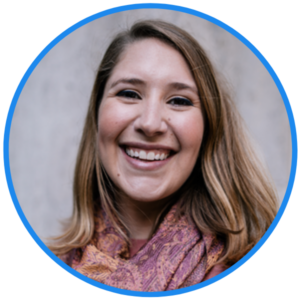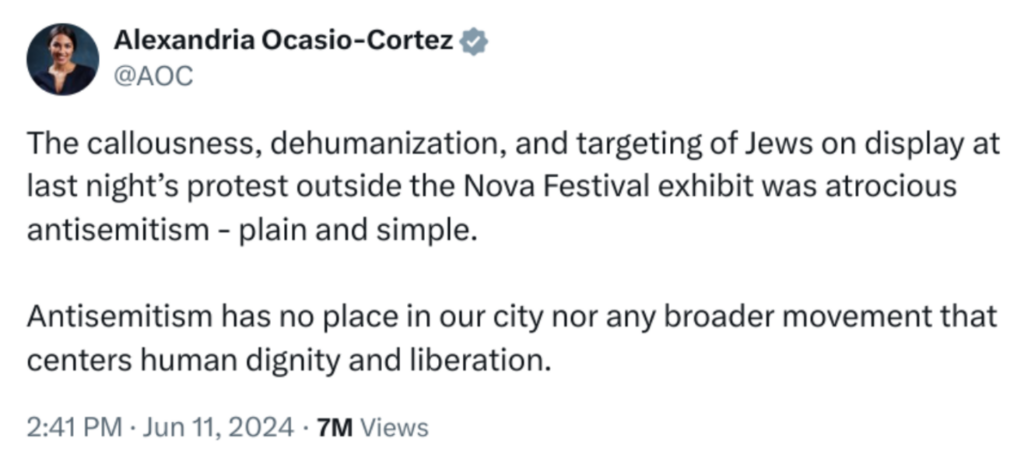
June 27, 2024
There is life pre-10/7. There is life post-10/7. As the CEO of Jewish Family Service Rabbi Will Berkovitz often says, it was a tectonic shift for the Jewish people.
The impacts within and beyond the Jewish community are deep and far-reaching. When I think of October 7 and the months after, the image that comes to mind is Moses, slamming his rod into the earth to part the Red Sea to reveal a path on which the Israelites walked to freedom. But instead of walking to freedom, in this image I see Jews pushed violently into the water in opposing directions, cast further and further from each other, and more isolated from our broader society.
How do we find our way back to each other and our broader communities?
Last week I had the honor and privilege of joining leaders from across the country in New York City at the Jewish Council for Public Affairs Summit: Coalition and Bridge-Building Post-October 7th. When I signed up for this summit, I was unsure if it was the right choice. I was exhausted and didn’t know if I was ready to emerge from the protective stance that has been my primary urge over the last few months. Thank goodness my sister lives in NYC and the promise of seeing “& Juliet” and eating good sushi with her was the push I needed to register.
What a fortuitous decision that turned out to be. Spending a full day surrounded by professionals and volunteers who, despite the immense challenges of this moment, are committed to coalition and bridge building, was exactly the booster shot I needed to recommit to our Federation’s JCRC and the work of community relations more broadly.
We learned from leaders like Maya Wiley, the President and CEO of the Leadership Conference on Civil and Human Rights who shared the importance of staying in relationship and working through disagreement despite challenges. Leaders like Idit Klein, the President and CEO of Keshet, who shared about finding the moments of light and hope in times of difficulty with allies. Leaders like JCPA President and CEO, Amy Spitalnick, who spoke about the immense criticism she endured for agreeing to do a webinar on antisemitism with Congresswoman Alexandria Ocasio-Cortez. Amy believed the path forward for the Jewish people in strengthening our democracy and the potential impact of speaking with AOC and her constituency was greater than the risk of “hechshering” anything AOC has ever said or done. “We don’t have to agree on everything to recognize how valuable it is to have leaders speak out against antisemitism,” said Amy.
And in fact, the day after this webinar, on June 11th, AOC condemned the antisemitic protests outside the Nova Music Festival exhibit in NYC, on Twitter, saying:

Of course, we must have some red lines. We cannot hide our identities or censor our lived experiences. But the toughest work is done not by walking away, but by staying at the table. The takeaways from the JCPA summit were clear and resounding – the work of JCRCs is hard, never-ending, and absolutely critical both for the health and safety of our democracy and the wellbeing of the Jewish people — the two being inextricably linked.
It takes courage to make choices toward these worthy goals in the face of immense criticism. But what, truly, is the alternative? Without bridge-building, we allow ourselves to be both isolated from the broader community and torn apart by divisions from within.
So as I reflect on the JCRC’s work from the last year, I am immensely proud of all our efforts, especially the ones that required continual recommitment to the foundational principles of coalition building and community relations:
Organizing the biggest Jewish community lobby day ever in Olympia with a legislative agenda, that, while focused on the Jewish community also helped create a statewide hate crimes hotline and prioritized funding for refugee resettlement and immigrant and asylee support;
Putting on the first local Asian-Jewish Passover Seder in partnership with the ADL;
Through our partners at Project Shema, training nearly 150 non-Jewish allies to understand and combat anti-Jewish harm;
And supporting countless community members who, many for the first time, experienced overt antisemitism in dialoguing with and educating their employers, schools, friends or neighbors.
Many of you probably know this quotation — “Optimism and hope are not the same. Optimism is the belief that the world is changing for the better; hope is the belief that, together, we can make the world better” – Rabbi Lord Jonathan Sacks.
What gives me hope for the JCRC’s year ahead is the deep impact of education and dialogue, the care and support I see us giving one another, and the brave spaces we are creating and entering both within and beyond the Jewish community. And above all, in spite of differences and disagreement, even stark ones, members of the JCRC striving to honor each other’s humanity.
Thank you to all the leaders of the Federation’s JCRC for your partnership, the donors to the Federation for making our work possible, and to community members for your continued engagement and support.
Kol Tov,

Max Patashnik
Director of JCRC & Government Affairs
Jewish Federation of Greater Seattle

The Jewish Federation of Greater Seattle is a 501(c)(3) non-profit organization.
Copyright © 2024 Jewish Federation of Greater Seattle. All rights reserved.